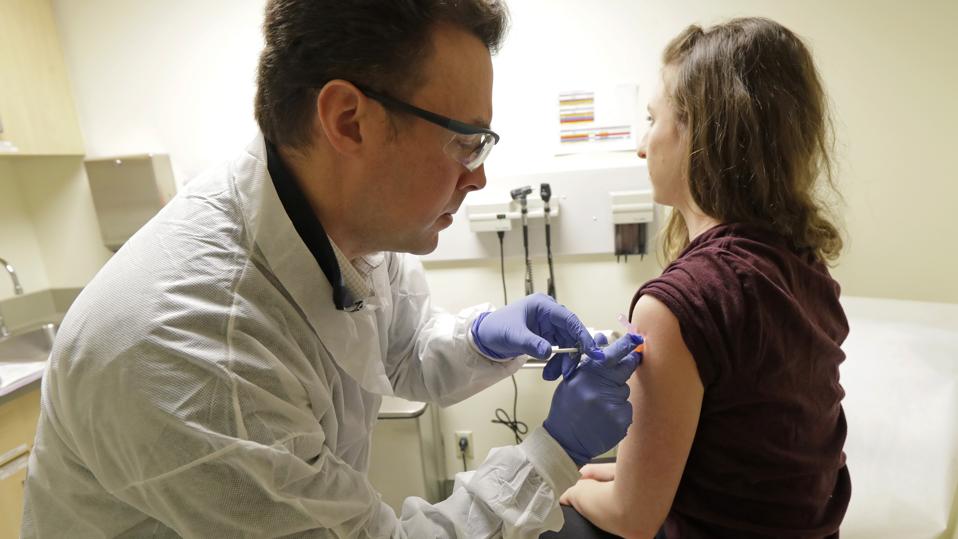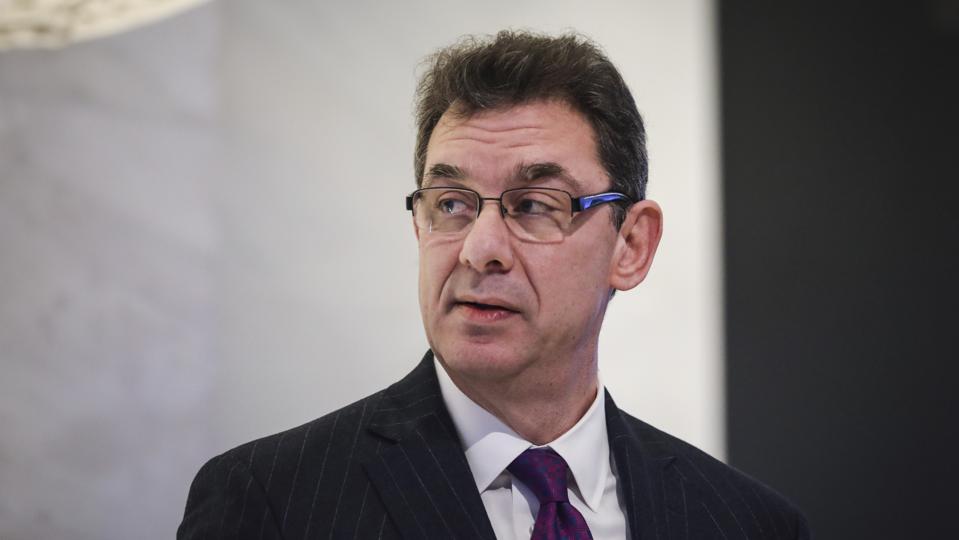
In the U.S., people will pay very little out-of-pocket for a vaccine.
ASSOCIATED PRESSWith Pfizer and Moderna both releasing promising interim clinical data in the past two weeks, the world is getting one step closer to having a Covid-19 vaccine on the market, but how much will it cost? The bottom line is that in the United States, at least, people will pay very little out-of-pocket—if anything at all. And given the significant amount of federal funding, many vaccine manufacturers are pricing well below what the market would bear.
The power of a vaccine depends on its price. No matter the clinical effectiveness, if too few people have access to the vaccine, the community can’t reach herd immunity, rendering the innovation moot. “The ultimate value of this vaccine will really be determined by coverage,” says Dr. Bruce Y. Lee, professor of health policy and management at the City University of New York. “If only a certain percentage of people get the vaccine, then we won't really have enough coverage to make a dent in the spread of the virus.”
The good news is that right now, the prices are pretty reasonable. Pfizer and BioNTech have set the initial price at $19.50 a dose, which comes to $39 per patient (since each vaccine requires a two-dose regimen), in its $1.95 billion contract with the federal government as part of Operation Warp Speed in July. Pfizer and BioNTech, which have developed an mRNA-based vaccine, will receive that amount for the first 100 million doses, pending regulatory approval. Moderna, which has developed a competing mRNA vaccine, received nearly $1 billion from the Biomedical Advanced Research and Development Authority and has a $1.5 billion contract for 100 million doses, bringing its price to around $50 per patient or $25 a dose.
These prices are in line with the annual flu vaccine, which is around $40 for uninsured patients and can have no out-of-pocket cost for many people with insurance. That’s even though the interim data suggests that the mRNA vaccines could be much more effective, and companies and governments have poured billions into their development. The flu vaccine hovers around 40 to 60% effectiveness each year, while the interim data showed 90% effectiveness for Pfizer and nearly 95% for Moderna, though this could change as the phase three trials continue.
What’s more, the federal government has stepped in to ensure that patients will see as little out-of-pocket costs for Covid-19 vaccines as possible. The Centers for Medicare and Medicaid Services is finalizing a rule that any Covid-19 vaccine with authorization from the Food and Drug Administration would be covered with no cost to seniors or low-income people in the government-funded health insurance programs. The Medicare reimbursement rate is $16.94 for the first dose and $28.39 for the final dose, for a total of $45.33. Most commercial insurers and self-funded employer health plans will also be on the hook for providing Covid-19 vaccines with no out-of-pocket costs through rules from the Departments of Labor and Treasury.
“What stands out with the Covid-19 vaccine is that even at really, really high prices, it's still net positive value.”
From a pure economic perspective, these vaccines could have a much higher price tag and still be worth it, given the substantial healthcare costs and worker absences caused by the pandemic. “What stands out with the Covid-19 vaccine is that even at really, really high prices, it's still net positive value,” says Lee.
Lee and his team at CUNY, known as the Public Health Informatics, Computational, Operations Research group, have been running U.S. pandemic simulations with and without a vaccine. If the vaccine were to only reduce the risk of severe disease, it would be cost saving up to $200-$800 for the two-dose regimen, depending on efficacy, according to the PHICOR analysis, which considers direct medical costs and productivity losses. If the vaccine prevents infection, the cost savings threshold would move even higher, ranging from $400-$1,100, depending on its efficacy. An analysis conducted by Quadrant Health Economics for Moderna determined that a “cost-conscious payer should be willing to pay up to $300” for a Covid-19 vaccination course with an efficacy of 60%.
Damien Conover, director of healthcare equity research at Morningstar, says companies are facing the pressure of a “social contract” when it comes to pricing the vaccines, with many manufacturers considering selling products at or near cost given the huge injection of federal funding. “At that very small price point and very commoditized, it doesn't seem like it's going to be overly profitable for most of the industry over the long-term,” says Conover. “And even in the near-term, I think it's going to be modestly positive.”
When asked about the $19.50 per dose price on Pfizer’s second quarter earnings call, CEO Albert Bourla responded: “Obviously, it is priced well, well, well, below the value that [this vaccine] brings to society.” Starting in 2022, as the immediate rush of need subsides, Bourla said he expected a situation where “the price will be based on the competition of the time and also will be based on the value that the product brings, which is not the case right now.”

Pfizer CEO Albert Bourla.
Drew Angerer/Getty ImagesThe kicker is that despite the value, prices will likely go lower still. Over the next few months will come competition, as more players flood the market with other vaccines based on different technologies. Johnson & Johnson, which is developing an adenovirus vector vaccine, kicked off its phase three trial on Monday. Johnson & Johnson has received around $500 million in development funding from Operation Warp Speed, as well as a commitment to buy 100 million doses at $1 billion, which would work out to around $15 per dose. The company would not comment on specific numbers, but said it has made a commitment to “not-for-profit pricing.”
Experts predict that commercial health plans will offer Covid-19 vaccines to customers with no copays, much like they did when it came to reimbursement of telemedicine visits after CMS changed the rules. “I anticipate employers, commercial payers, public payers, will really make sure that they're not creating any kind of cost barrier and will likely absorb whatever the costs are of the vaccine,” says Esther Krofah, executive director of FasterCures, a center of the Milken Institute, which has been tracking daily updates on Covid-19 vaccines and treatments. This needs to extend globally, she adds: “If we solve it in the U.S. and we don't solve it the rest of the world, we actually haven't gotten past this pandemic.”
While access and affordability are key, the other major priority needs to be educating the public about the vaccines through a collaboration of private, public and community organizations. “We need a ground game,” says Krofah. “We need unified messages for people so they understand what's coming. We can't do it when a vaccine is available, we need to start doing it now.”
"much" - Google News
November 18, 2020 at 05:22AM
https://ift.tt/2INtLEc
How Much Will A Covid-19 Vaccine Cost? - Forbes
"much" - Google News
https://ift.tt/37eLLij
Shoes Man Tutorial
Pos News Update
Meme Update
Korean Entertainment News
Japan News Update
Bagikan Berita Ini














0 Response to "How Much Will A Covid-19 Vaccine Cost? - Forbes"
Post a Comment